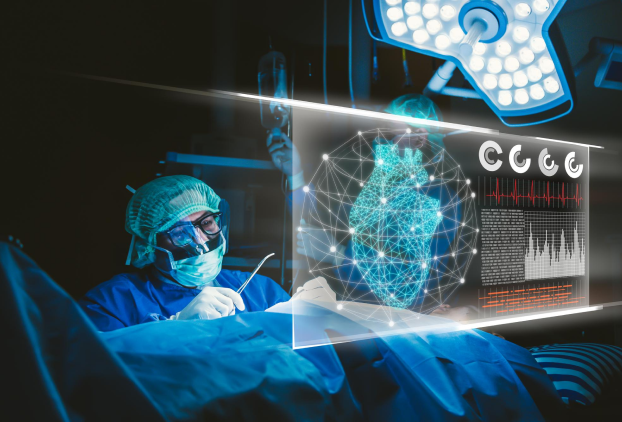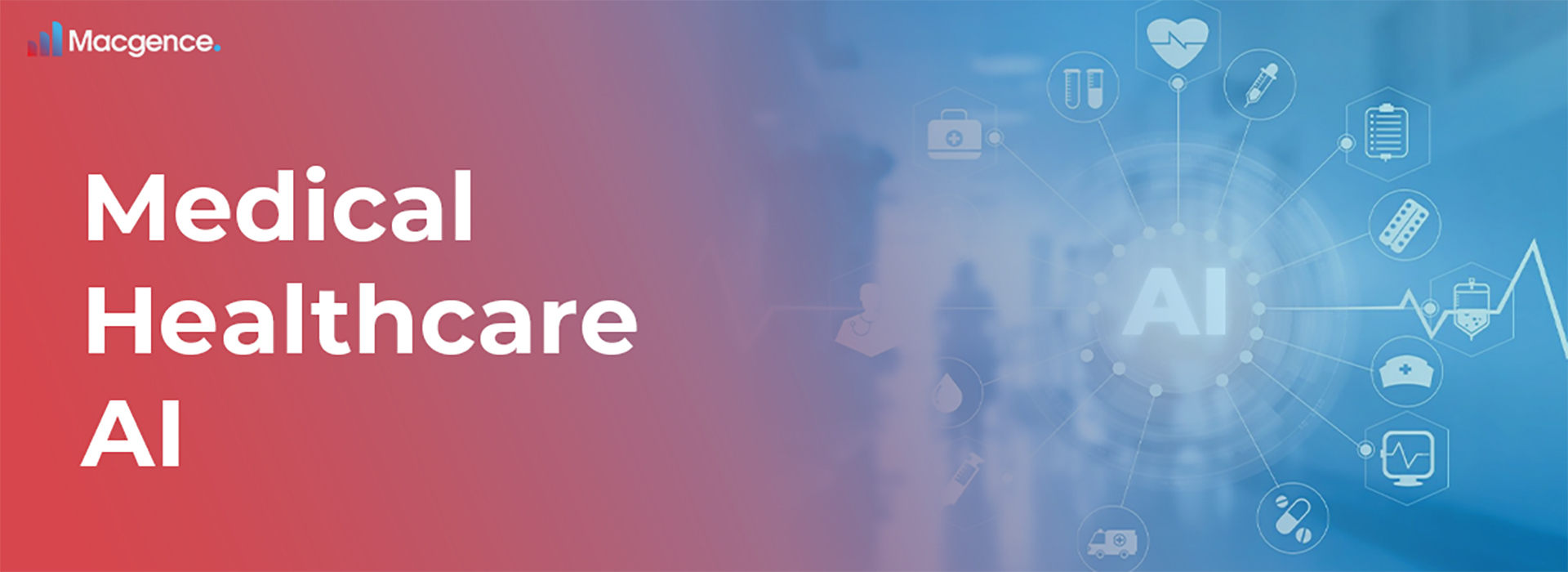AI & NLP - Revolutionizing Healthcare
Have a computer vision project in mind? Let’s connect

In the field of healthcare, moreover, artificial intelligence (AI) has proven itself to be a revolutionary force, improving diagnosis, treatment plans, and patient care. Training data is a key component that defines how effective AI is in the healthcare industry. In fact, AI models’ capacity to generate precise forecasts and well-informed judgments is strongly impacted by the caliber, diversity, and volume of data used to train them. Additionally, healthcare data training enables AI systems to identify trends and irregularities.
How AI in Healthcare AI & NLP Solutions is Revolutionizing Patient Care and Medical Practices
The use of artificial intelligence (AI) in healthcare marks a major shift in the ways physicians identify, address, and oversee the health of their patients. The following are the benefits of AI in healthcare:
Efficiency and Automation
AI automates and simplifies repetitive operations, such as data analysis and administrative procedures. As a result, healthcare workers are positively affected by this efficiency, which frees them up to focus more on patient care and complex medical decisions. Furthermore, this shift on heltcare AI not only improves job satisfaction but also enhances the quality-of-care patients receive.
Enhanced Patient Outcomes
AI applications like predictive analytics and personalized treatment strategies significantly contribute to improved patient outcomes. Moreover, machine learning (ML) algorithms optimize healthcare delivery by analyzing large datasets, identifying patterns, and suggesting tailored therapies. As a result, healthcare providers can make more informed decisions, leading to better patient care.
Accessibility and Inclusivity
AI technology provides innovative solutions for those with hearing or vision impairments, enhancing patient convenience. For instance, voice recognition, image identification, and natural language processing (NLP) are key technologies that contribute to creating a more inclusive and accessible hospital environment. Consequently, these advancements improve the overall patient experience.
Diagnostic
Precision
AI significantly boosts medical diagnostics by analyzing imaging, pathology slides, and patient records, thereby enhancing accuracy. Moreover, early identification of diseases, facilitated by these improved diagnostics, leads to more successful and timely treatment options for patients. As a result, healthcare providers can offer more precise and effective care, improving patient outcomes.
Data-Driven Decision-Making
AI in healthcare transforms patient care through remote monitoring. Additionally, wearables and AI-linked sensors enable continuous tracking, providing real-time data for proactive intervention, personalized care, and early health issue detection. This approach empowers healthcare providers to respond swiftly, improving patient outcomes and enhancing overall care quality.
Remote Patient Monitoring
AI models utilizing patient monitoring data, including warning signs and wearable device information, further simplify remote monitoring of chronic conditions, enhancing healthcare accessibility and facilitating proactive management for better patient outcomes. Consequently, this technology allows for timely interventions, empowering patients to take charge of their health.
Popular Use Cases for AI Training Data in Healthcare AI & NLP Solutions
Medical Imaging Analysis
AI uses annotated medical images to enhance diagnostic accuracy. By doing so, training on diverse datasets improves the identification of anomalies, aiding radiologists in detecting diseases like cancer at early stages with increased precision.
Patient Outcome Prediction
AI systems trained on patient data can forecast possible problems and health outcomes. Consequently, this helps healthcare professionals plan proactive, personalized patient care by lowering hospital readmission rates and enhancing patient outcomes.
Drug Discovery
Training AI accelerates drug development by incorporating genetic information, clinical trial findings, and molecular structures. In addition, AI aids in identifying potential medication candidates, expediting the research and development phase.
NLP in EHR
AI models trained on extensive electronic health record datasets can uncover patterns and insights from clinical notes, thus significantly improving data interoperability. As a result, this makes it easier for healthcare practitioners to access information.
Virtual Health Assistants
AI-driven virtual assistants not only answer questions about medications but also provide individual health information, as they are precisely trained on patient interaction datasets. Consequently, this personalized support leads to patients adhering more diligently.
Disease Risk Prediction
AI predicts individual vulnerability to disease by evaluating vast datasets, including genetic, lifestyle, and environmental variables. Consequently, this Disease Risk Prediction enables preventative and early treatment, revolutionizing healthcare.
Remote Patient Monitoring
AI models utilizing patient tracking data, including warning signs and wearable tool statistics, simplify remote monitoring of chronic conditions, thereby improving healthcare accessibility and facilitating proactive management for better patient outcomes.
Billing Fraud Prevention
AI models, derived from historical claims data, optimize billing and detect fraud in healthcare. Consequently, this dual functionality safeguards against financial losses, reduces errors, and ensures precise invoicing for enhanced financial integrity.
Personalized Treatment Plans
AI models help create customized treatments by applying their predictions to patient demographics, medical history, and treatment outcomes. As a result, this promotes precision medicine by adjusting treatments to the unique characteristics of each patient.
Robot-Assisted Surgeries
Artificial Intelligence models assist surgeons in complex operations, enhancing precision and reducing errors. Consequently, healthcare applications depend on diverse datasets, improving diagnosis and personalizing treatment for optimal outcomes.
Genomic Data Analysis
Artificial Intelligence leverages different type of genomic datasets, analyzing genetic factors underlying diseases. Thus, this empowers personalized treatments, propelling advancements in genomic research for transformative healthcare solutions.
Rehabilitation Assistance
Artificial Intelligence models analyze rehabilitation data, movement patterns, and recovery progress. Consequently, this empowers healthcare professionals to optimize personalized strategies for enhanced patient outcomes through tailored rehabilitation care.
How Can Macgence's AI Training Data Improve Your Healthcare AI Models?
Training Accuracy
Our high-quality data exposes your AI model to a diverse range of scenarios it might encounter in the real world. It ensures the model becomes more accurate and reliable in understanding different healthcare situations.
Reduced Bias
Macgence’s datasets are carefully curated to minimize biases in your healthcare AI models. We help your AI model avoid unfair preferences related to specific groups or characteristics by ensuring a balanced representation of data.
Real-World Application
We provide AI training data that directly influences how well your healthcare AI models perform in real-world situations. It increases the chances of your model providing meaningful and dependable results when faced with various healthcare-related inputs.
Robustness
We incorporate various situations and edge cases in our training data making your healthcare AI model more robust. Thus, your AI model becomes better at handling different backgrounds and other real-world factors.
Advanced data security
We maintain the best privacy and data security standards. Additionally, we adhere to ISO-27001 & HIPAA standards.

Recent Highlights & Top
Insights
from Our Blog

There's no denying the fact that in the recent few years, healthcare AI companies have

The use of machine learning and natural language processing models in the field of medicine

In the dynamic world of healthcare, there's a remarkable tool called Artificial Intelligence (AI) that's
We're here to help with
any questions
Get In touch
Maximise Potential with Macgence’s
Data Generation and Collection Services
powering AI projects and driving innovation.
